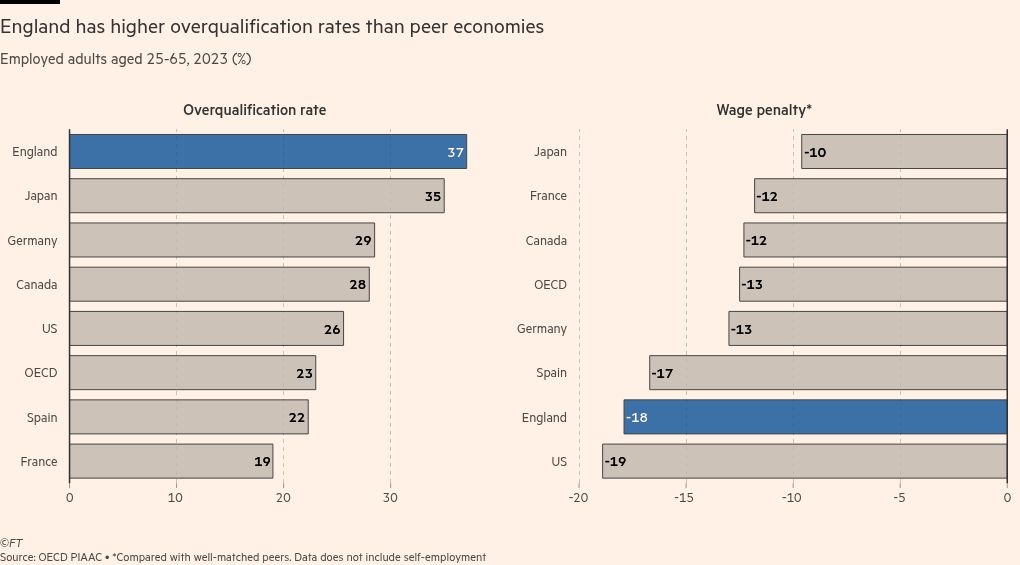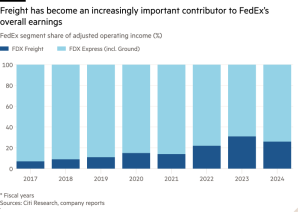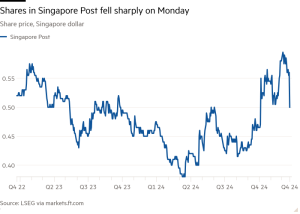Workers in England more likely to be overqualified than global peers, finds OECD

Stay informed with free updates
Simply sign up to the UK employment myFT Digest — delivered directly to your inbox.
Workers in England are more likely to be overqualified than in any other advanced economy in the OECD, according to a study that raises questions about the opportunities available to British graduates.
More than one-third of employees aged 25 and over reported having higher education levels than required for their job, according to a once-a-decade survey published by the organisation on Tuesday.
The rate has risen from around 30 per cent in 2012 to more than 37 per cent in 2023, the highest across the 31 nations surveyed and far higher than the OECD average of 23 per cent.
The data throws a spotlight on the country’s struggle to create enough graduate jobs outside London, say economists, underlining the importance of government targets to boost critical industries beyond the capital.
The Labour government has promised to unveil a new industrial strategy next spring which will focus on delivering targeted state support to eight “high-growth” sectors, including advanced manufacturing, clean energy, defence and life sciences.
“High growth in professional service occupations like finance, consulting and law has increased demand for graduates, but it’s been hugely concentrated in and around London,” said Xiaowei Xu, senior research economist at the Institute for Fiscal Studies think-tank.
Only around a fifth of graduates working in financial and business services report being overqualified, far below the rate of 58 per cent in retail and hospitality, according to previous research by the Chartered Institute of Personnel and Development, a professional body.
The clustering of professional services in the capital has created a “self-reinforcing cycle” that could not be broken by token gestures like relocating civil service departments to the regions, said Xu.
“Lots of people just aren’t willing or able to move, whether that’s driven by cost or preference,” she added, pointing to “extremely high” housing costs. “You need to create a counterweight to London.”
Graduate numbers have also increased more rapidly in the UK than in peer economies, meaning the share of young adults with a degree is among the highest in the OECD, at 60 per cent.
The findings are likely to fuel questions over the value of obtaining a degree at a time when the share of school leavers going to university in the UK is falling, partly as a result of rising living costs and concern over the value of “low-value” courses.
Andreas Schleicher, OECD director for education and skills, said England was seeing the pay-off of past investments in skills policy but that substantial improvements were needed to increase productivity.
“The UK university system is under financial pressure because so many young people do not get that labour market value out of their degrees,” he added.
“There’s a part of the sector that can sell credentials that it doesn’t actually deliver in substance.”
However, Nick Hillman, director of the Higher Education Policy Institute, a think-tank, argued that degrees provide wider personal and societal benefits.
“Let’s stop blaming individuals for bettering themselves through education and start looking to see what more employers can do to make the most of the staff they have,” he added.
Vivienne Stern, chief executive of Universities UK, the lobby group, said the value of a degree was clear from the fact that areas with the highest productivity also had a larger share of workers with higher education qualifications.
English workers who reported being overqualified for their job earned nearly 18 per cent less than peers with the same skills and education who were well-matched to their role, according to the OECD.
The survey, which assessed adult skills between spring 2022 and summer 2023, revealed numeracy levels declined in seven of the 27 economies that also participated in the previous edition — England was one of eight countries where numeracy skills improved.
Literacy stagnated in 14 economies and declined in 11, with only Finland and Denmark registering improvements.
England’s overall literacy score stayed the same, but was one of just three economies to register a rise in standards among 16- to 24-year-olds.
UK minister for skills Jacqui Smith said: “We are determined to break down barriers to opportunity by developing a culture of lifelong learning, and this report shows that we can and must do more to ensure everyone has the skills they need to get on in life.”
#Workers #England #overqualified #global #peers #finds #OECD







